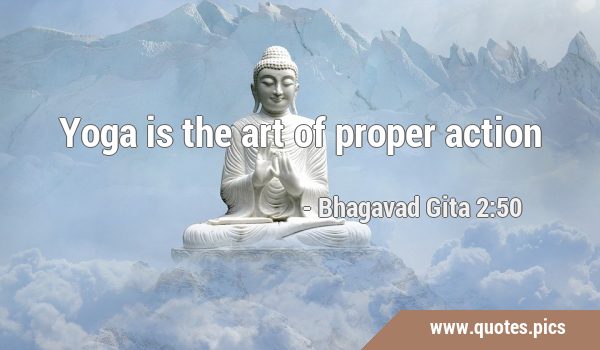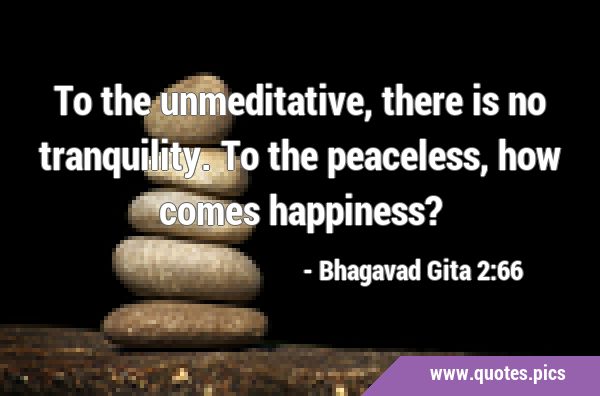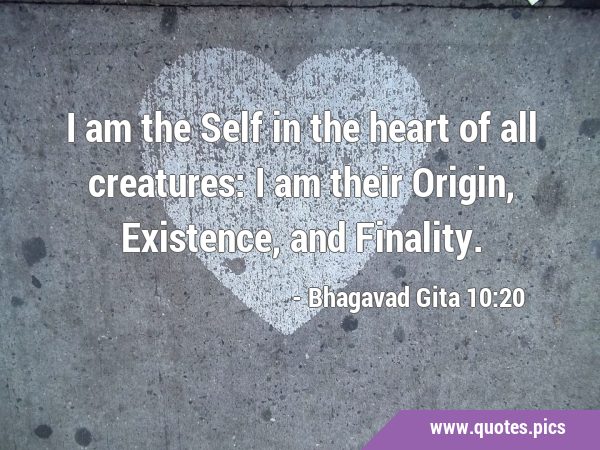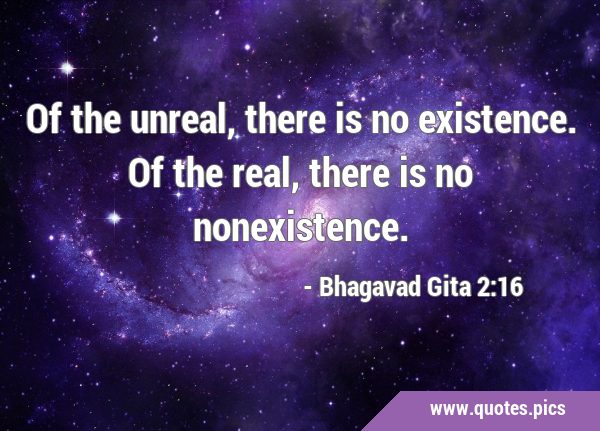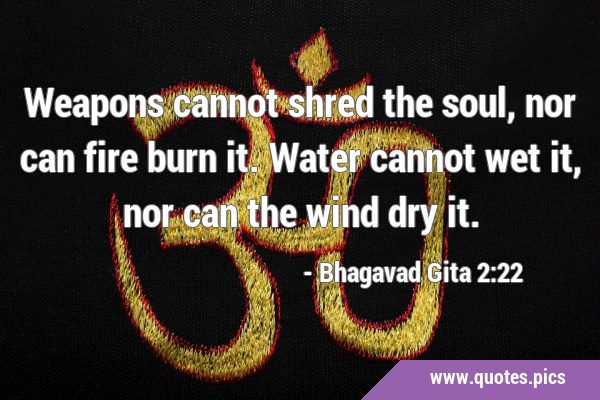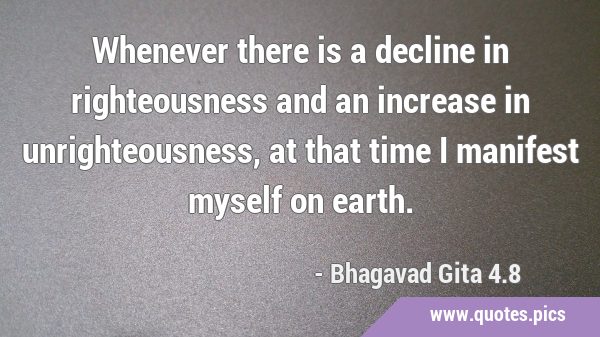 Perform all actions forsaking attachment to the fruits of actions, being indifferent to success and failure. Such mental equanimity is called Yoga
Perform all actions forsaking attachment to the fruits of actions, being indifferent to success and failure. Such mental equanimity is called YogaFailure Success Action Yoga
 He who is undisturbed by anxiety under afflictions, nor attached to happiness under favorable circumstances; he who is free from worldly loves, fears & anger- is called a sage of steady wisdom
He who is undisturbed by anxiety under afflictions, nor attached to happiness under favorable circumstances; he who is free from worldly loves, fears & anger- is called a sage of steady wisdomWisdom
 As a boat on the waters is carried off course by a gale, so an individual's discrimination is driven from its intended path when the mind succumbs to the wandering senses.
As a boat on the waters is carried off course by a gale, so an individual's discrimination is driven from its intended path when the mind succumbs to the wandering senses.Wisdom Mind Self control
 He who is everywhere nonattached, neither joyously excited by encountering good nor disturbed by evil, has an established wisdom
He who is everywhere nonattached, neither joyously excited by encountering good nor disturbed by evil, has an established wisdomWisdom
 He who withdraws his senses from the objects of perception, just as a tortoise withdraws its limbs into its shell, is established in steady wisdom
He who withdraws his senses from the objects of perception, just as a tortoise withdraws its limbs into its shell, is established in steady wisdomWisdom Analogy Self control
 As the ignorant perform actions with attachment and hope of reward, so the wise should act with dispassionate nonattachment, to serve gladly as a guide for the multitudes.
As the ignorant perform actions with attachment and hope of reward, so the wise should act with dispassionate nonattachment, to serve gladly as a guide for the multitudes.Action
 He who is not affected by pain and pleasure, he who is calm and evenminded during pain and pleasure, he alone is eligible for immortality
He who is not affected by pain and pleasure, he who is calm and evenminded during pain and pleasure, he alone is eligible for immortalityPain Self control Pleasure
 That which is born must die, and that which is dead must be born again. Therefore, you shouldn't lament about the unavoidable
That which is born must die, and that which is dead must be born again. Therefore, you shouldn't lament about the unavoidableDeath
 The beginning of all beings is veiled, beings manifest in the middle, and unmanifest again on death. Then, why lament this truth?
The beginning of all beings is veiled, beings manifest in the middle, and unmanifest again on death. Then, why lament this truth?Death Life Philosophy Truth
 Miserable are those who perform actions only for their fruits
Miserable are those who perform actions only for their fruitsShort Action
Wisdom +
Bhagavad Gita quotes
⇑
Wisdom Quotes
 He is a wise man whose pursuits are all without selfish plan or longings for results, and whose activities are purified by the fire of wisdom.
He is a wise man whose pursuits are all without selfish plan or longings for results, and whose activities are purified by the fire of wisdom.Wisdom
 Self-realized sages behold with an equal eye a learned and humble Brahmin, a cow, an elephant, a dog, and a dog-eater.
Self-realized sages behold with an equal eye a learned and humble Brahmin, a cow, an elephant, a dog, and a dog-eater.Wisdom Self realization
 You have control over the activity you perform, never the resultant fruit of your actions. Do not consider yourself the creator of the fruits of your activities, nor be attached to inaction
You have control over the activity you perform, never the resultant fruit of your actions. Do not consider yourself the creator of the fruits of your activities, nor be attached to inactionWisdom Action
 Even if you are the chief sinner among all sinners, yet by the sole raft of wisdom you shall safely cross the sea of sin
Even if you are the chief sinner among all sinners, yet by the sole raft of wisdom you shall safely cross the sea of sinWisdom
 As enkindled flame converts firewood into ashes, so does the fire of wisdom consume to ashes all karma.
As enkindled flame converts firewood into ashes, so does the fire of wisdom consume to ashes all karma.Wisdom
 Verily, nothing else in this world is as sanctifying as wisdom. In due course of time, the devotee who is successful in yoga will spontaneously realize this within his Self.
Verily, nothing else in this world is as sanctifying as wisdom. In due course of time, the devotee who is successful in yoga will spontaneously realize this within his Self.Wisdom Yoga Spirituality Self realization
 To the knower of Brahman (spirit), all the Vedas (scriptures) are of no utility than is a reservoir when there is a flood from all directions
To the knower of Brahman (spirit), all the Vedas (scriptures) are of no utility than is a reservoir when there is a flood from all directionsWisdom Knowledge Self realization
 The senses naturally experience attachment and aversion to the sense objects but do not be controlled by them, for they are one's enemies
The senses naturally experience attachment and aversion to the sense objects but do not be controlled by them, for they are one's enemiesWisdom Enemy Control
All bhagavad gita Quotes ⇑
 The man of self-control, roaming among material objects with subjugated senses, and devoid of attraction and repulsion, attains an unshakable inner calmness
The man of self-control, roaming among material objects with subjugated senses, and devoid of attraction and repulsion, attains an unshakable inner calmnessSelf control
 He is full with contentment who absorbs all desires within, as the brimful ocean remains unmoved by waters entering into it
He is full with contentment who absorbs all desires within, as the brimful ocean remains unmoved by waters entering into itDesire Philosophy Wisdom Analogy
 Actionlessness is not attained simply by avoiding actions. By forsaking work no one reaches perfection.
Actionlessness is not attained simply by avoiding actions. By forsaking work no one reaches perfection.Work Action
 He is truly a yogi who, on this earth and up to the very time of death, is able to master every impulse of desire and wrath. He is a happy man
He is truly a yogi who, on this earth and up to the very time of death, is able to master every impulse of desire and wrath. He is a happy manDeath Desire
 For those who have conquered the mind, the mind is their friend. For those who have failed to do so, the mind acts like an enemy.
For those who have conquered the mind, the mind is their friend. For those who have failed to do so, the mind acts like an enemy.Philosophy Wisdom Enemy Mind
 He is a supreme yogi who regards with equal-mindedness all men -patrons, friends, enemies, strangers, mediators, hateful beings, relatives, the virtuous and the ungodly
He is a supreme yogi who regards with equal-mindedness all men -patrons, friends, enemies, strangers, mediators, hateful beings, relatives, the virtuous and the ungodlyKindness Enemy
 Just as a lamp in a windless place does not flicker, so the disciplined mind of a yogi remains steady in meditation
Just as a lamp in a windless place does not flicker, so the disciplined mind of a yogi remains steady in meditationAnalogy Mind Meditation Yoga
 The ideas of heat & cold, pleasure & pain, are produced by the contact of the senses with their objects. Such ideas are limited by a beginning & an end, they are transitory, bear them with patience
The ideas of heat & cold, pleasure & pain, are produced by the contact of the senses with their objects. Such ideas are limited by a beginning & an end, they are transitory, bear them with patiencePhilosophy Wisdom Pain Spirituality
 The soul is neither born nor does it ever die, having never existed will it ever cease to be. The soul is birthless, eternal, changeless, immortal
The soul is neither born nor does it ever die, having never existed will it ever cease to be. The soul is birthless, eternal, changeless, immortalPhilosophy Soul Existence Non-duality
 When a man completely relinquishes all desires of the mind and is entirely contented in the self, by the self, he is then considered to be settled in wisdom
When a man completely relinquishes all desires of the mind and is entirely contented in the self, by the self, he is then considered to be settled in wisdomDesire Wisdom Mind Yoga
 Brooding on sense objects causes attachment to them. Attachment creates craving; craving leads to anger
Brooding on sense objects causes attachment to them. Attachment creates craving; craving leads to angerAnger Desire
 There is no one who can remain without action even for a moment. Indeed, all beings are compelled to act by their qualities(Gunas) born of material nature(Prakriti)
There is no one who can remain without action even for a moment. Indeed, all beings are compelled to act by their qualities(Gunas) born of material nature(Prakriti)Nature Action
 Giving up attachment, perform actions as a matter of duty, for by working without being attached to the fruits, one attains the supreme bliss
Giving up attachment, perform actions as a matter of duty, for by working without being attached to the fruits, one attains the supreme blissAction
 It is far better to perform one's natural prescribed duty, though tinged with faults than to perform another's prescribed duty, though perfectly.
It is far better to perform one's natural prescribed duty, though tinged with faults than to perform another's prescribed duty, though perfectly.
 Just as a fire is covered by smoke, a mirror is masked by dust, and an embryo is concealed by the womb; similarly, one's knowledge gets covered by desire
Just as a fire is covered by smoke, a mirror is masked by dust, and an embryo is concealed by the womb; similarly, one's knowledge gets covered by desireDesire Philosophy Knowledge
 Free from expectations and the sense of ownership, with mind and intellect fully controlled, they incur no sin, even though performing actions by one's body.
Free from expectations and the sense of ownership, with mind and intellect fully controlled, they incur no sin, even though performing actions by one's body.Expectation Mind Control Body
 He who is of purified intellect, who controls the mind and senses, feels his self as the Self-existing in all beings.
He who is of purified intellect, who controls the mind and senses, feels his self as the Self-existing in all beings.Self realization
 Sense pleasures that arise from contact with the sense objects are ephemeral, they are begetters only of misery. No sage seeks happiness from them.
Sense pleasures that arise from contact with the sense objects are ephemeral, they are begetters only of misery. No sage seeks happiness from them.Philosophy Pleasure
 The yogis who have conquered the mind rise above the dualities of cold and heat, joy and sorrow, honor and dishonor. Such yogis remain tranquil and ever fully established in the Supreme Self
The yogis who have conquered the mind rise above the dualities of cold and heat, joy and sorrow, honor and dishonor. Such yogis remain tranquil and ever fully established in the Supreme SelfMind Joy
 Those who are moderate in eating and recreation, balanced in work, and regulated in sleep, and remain awake will attain 'yoga'- the destroyer of suffering.
Those who are moderate in eating and recreation, balanced in work, and regulated in sleep, and remain awake will attain 'yoga'- the destroyer of suffering.Work Yoga
 Completely renouncing all desires arising from material thoughts, one should restrain the senses with the mind from all sides
Completely renouncing all desires arising from material thoughts, one should restrain the senses with the mind from all sidesDesire Mind Thought
 Whenever and wherever the restless and unsteady mind wanders, one should bring it back and continually focus it on the self
Whenever and wherever the restless and unsteady mind wanders, one should bring it back and continually focus it on the selfMind Meditation Yoga
 That yogi stays forever in Me, who, anchored in divine unity whatever his mode of existence, realizes Me as pervading all beings.
That yogi stays forever in Me, who, anchored in divine unity whatever his mode of existence, realizes Me as pervading all beings.Existence
 Undoubtedly the mind is fickle and unruly; but by yoga practice and by dispassion, the mind may nevertheless be controlled.
Undoubtedly the mind is fickle and unruly; but by yoga practice and by dispassion, the mind may nevertheless be controlled.Philosophy Wisdom Mind Control
 A performer of good actions never meets destruction. Whether in this world or in the beyond, he falls not into evil plight
A performer of good actions never meets destruction. Whether in this world or in the beyond, he falls not into evil plightEvil Action
 An eager student of even theoretical yoga is farther advanced than is a follower of the outward scriptural rites
An eager student of even theoretical yoga is farther advanced than is a follower of the outward scriptural ritesYoga
 Whatever embodiment (a God-incarnate, a saint, or a deity) a devotee strives faithfully to worship, it is I who make his devotion unflinching
Whatever embodiment (a God-incarnate, a saint, or a deity) a devotee strives faithfully to worship, it is I who make his devotion unflinchingFaith God Devotion
 I am the Self in the heart of all creatures: I am their Origin, Existence, and Finality.
I am the Self in the heart of all creatures: I am their Origin, Existence, and Finality.Heart Short Existence
 Those who neither rejoice in pleasures nor despair in sorrows, neither lament for any loss nor hanker for any gain, who renounce both good & evil deeds, such persons are dear to me
Those who neither rejoice in pleasures nor despair in sorrows, neither lament for any loss nor hanker for any gain, who renounce both good & evil deeds, such persons are dear to meLoss Pleasure
 When a man beholds all separate beings as existent in the One that has expanded Itself into the many, he then merges with Brahman
When a man beholds all separate beings as existent in the One that has expanded Itself into the many, he then merges with BrahmanGod Non-duality
 I am seated in the hearts of all living beings, and from Me come memory, knowledge, as well as forgetfulness.
I am seated in the hearts of all living beings, and from Me come memory, knowledge, as well as forgetfulness.God Heart Knowledge Memory
 Lust, anger, and greed—these constitute the threefold gate of hell leading to the destruction of the soul's welfare. The man should abandon these three
Lust, anger, and greed—these constitute the threefold gate of hell leading to the destruction of the soul's welfare. The man should abandon these threeAnger
 It is truly impossible for an embodied being to abandon actions completely, but he who relinquishes the fruit of action is called a renunciant.
It is truly impossible for an embodied being to abandon actions completely, but he who relinquishes the fruit of action is called a renunciant.Action
 Those whose intellect is unattached everywhere, who have mastered the mind, and are free from desires by the practice of renunciation, attain the highest perfection of freedom from action
Those whose intellect is unattached everywhere, who have mastered the mind, and are free from desires by the practice of renunciation, attain the highest perfection of freedom from actionFreedom Mind Action Intelligence
 The truly wise mourn neither for those who are living nor for those who have passed away
The truly wise mourn neither for those who are living nor for those who have passed awayShort Wisdom
 Just as a person forsakes worn-out clothes and wears new clothes, the soul leaves the worn-out body at the time of death and enters a new body
Just as a person forsakes worn-out clothes and wears new clothes, the soul leaves the worn-out body at the time of death and enters a new bodyDeath Soul Body
 The soul that dwells in the bodies of all beings is immortal, Therefore do not mourn
The soul that dwells in the bodies of all beings is immortal, Therefore do not mournShort Soul
 There is nothing more fortunate for a warrior than a righteous battle
There is nothing more fortunate for a warrior than a righteous battle
 That which is a night (of slumber) to all creatures is (luminous) wakefulness to the man of self-mastery. And what is wakefulness to ordinary men, that is a night to the divinely perceptive sage
That which is a night (of slumber) to all creatures is (luminous) wakefulness to the man of self-mastery. And what is wakefulness to ordinary men, that is a night to the divinely perceptive sagePhilosophy Perception
 Perform those actions that are obligatory, for action is better than inactivity; even simple maintenance of thy body would be impossible through inaction.
Perform those actions that are obligatory, for action is better than inactivity; even simple maintenance of thy body would be impossible through inaction.Action
 Work must be done as a sacrifice to the Supreme Lord; otherwise, work causes bondage in this material world.
Work must be done as a sacrifice to the Supreme Lord; otherwise, work causes bondage in this material world.Work
 Whatever a great person does, common people imitate. His actions set a standard for the people of the world.
Whatever a great person does, common people imitate. His actions set a standard for the people of the world.Action Society World People
 All activities are carried out by the three modes of material nature. But in ignorance, the soul, deluded by false identification with the body, thinks itself to be the doer.
All activities are carried out by the three modes of material nature. But in ignorance, the soul, deluded by false identification with the body, thinks itself to be the doer.Nature Philosophy Soul Ignorance
 Even wise people act according to their natures, for all living beings are propelled by their natural tendencies. What will one gain by repression?
Even wise people act according to their natures, for all living beings are propelled by their natural tendencies. What will one gain by repression?Nature Wisdom People
 It is preferable to die in the discharge of one's duty than to follow the path of another, which is fraught with danger.
It is preferable to die in the discharge of one's duty than to follow the path of another, which is fraught with danger.
 In whatever way people surrender unto me, I reciprocate with them accordingly. Everyone follows my path, knowingly or unknowingly
In whatever way people surrender unto me, I reciprocate with them accordingly. Everyone follows my path, knowingly or unknowinglySpirituality
 Those who see action in inaction and inaction in action are truly wise amongst humans. Although performing all kinds of actions, they are yogis and masters of all their actions.
Those who see action in inaction and inaction in action are truly wise amongst humans. Although performing all kinds of actions, they are yogis and masters of all their actions.Action
 Relinquishing attachment to the fruits of work, always contented, independent of material rewards, the wise do not perform any binding action even in the midst of activities
Relinquishing attachment to the fruits of work, always contented, independent of material rewards, the wise do not perform any binding action even in the midst of activitiesFreedom Wisdom Action
 Salvation is found by both renunciation and performance of the action. But of these two, the Yoga of action (Karma Yoga) is better than the renunciation of works.
Salvation is found by both renunciation and performance of the action. But of these two, the Yoga of action (Karma Yoga) is better than the renunciation of works.Action
 Just as a lotus leaf is unsullied by water, the yogi who performs actions, forswearing attachment and surrendering his actions to the Infinite, remains unbound by the sin
Just as a lotus leaf is unsullied by water, the yogi who performs actions, forswearing attachment and surrendering his actions to the Infinite, remains unbound by the sinAnalogy
 He who perceives Me everywhere and beholds everything in me never loses sight of me, nor do I ever lose sight of him
He who perceives Me everywhere and beholds everything in me never loses sight of me, nor do I ever lose sight of himGod
 Among thousands of men, perhaps one strives for spiritual attainment; and, among the blessed true seekers that assiduously try to reach Me, perhaps one perceives Me as I am.
Among thousands of men, perhaps one strives for spiritual attainment; and, among the blessed true seekers that assiduously try to reach Me, perhaps one perceives Me as I am.Spirituality Self realization
 There is nothing higher than Me, or beyond Me. All things are strung to Me like a row of gems on a thread.
There is nothing higher than Me, or beyond Me. All things are strung to Me like a row of gems on a thread.God Existence Non-duality
 I am impartial toward all beings. To Me none is hateful, none is dear. But those who give Me their heart's love are in Me, as I am in them
I am impartial toward all beings. To Me none is hateful, none is dear. But those who give Me their heart's love are in Me, as I am in themHeart Love
 Those devotees are very dear to Me who are free from malice toward all living beings, who are friendly, and compassionate.
Those devotees are very dear to Me who are free from malice toward all living beings, who are friendly, and compassionate.Kindness Humanity
 He who is tranquil before friend and foe alike, and in encountering adoration and insult, and during the experiences of warmth and chill and of pleasure and suffering... that person is dear to Me
He who is tranquil before friend and foe alike, and in encountering adoration and insult, and during the experiences of warmth and chill and of pleasure and suffering... that person is dear to MeFriends Enemy Suffering Pleasure
 Free yourself from the triple qualities (Sattva, Rajas, Tamas) and from the pairs of opposites, eternally fixed in the truth, harboring no thoughts of receiving and keeping, be settled in the self
Free yourself from the triple qualities (Sattva, Rajas, Tamas) and from the pairs of opposites, eternally fixed in the truth, harboring no thoughts of receiving and keeping, be settled in the selfPhilosophy Truth
 The strong and turbulent senses can forcibly seize the mind even of a person with a high degree of enlightenment and self-control.
The strong and turbulent senses can forcibly seize the mind even of a person with a high degree of enlightenment and self-control.Desire Mind Self control
 The senses are superior to the gross body, and superior to the senses is the mind. Beyond the mind is the intellect, and even beyond the intellect is the soul.
The senses are superior to the gross body, and superior to the senses is the mind. Beyond the mind is the intellect, and even beyond the intellect is the soul.Soul Mind Body
 Content with whatever gain comes of its own accord, and free from envy, the wise are beyond the dualities of life. Being equipoised in success and failure, they are not bound by their actions
Content with whatever gain comes of its own accord, and free from envy, the wise are beyond the dualities of life. Being equipoised in success and failure, they are not bound by their actionsFailure Success
 Weapons cannot shred the soul, nor can fire burn it. Water cannot wet it, nor can the wind dry it.
Weapons cannot shred the soul, nor can fire burn it. Water cannot wet it, nor can the wind dry it.Short Soul Non-duality
 The soul is uncuttable, it cannot be burnt, dampened, or dried. The soul is immutable, all-pervading, eternal
The soul is uncuttable, it cannot be burnt, dampened, or dried. The soul is immutable, all-pervading, eternalSoul
 Whenever there is a decline in righteousness and an increase in unrighteousness, at that time I manifest myself on earth.
Whenever there is a decline in righteousness and an increase in unrighteousness, at that time I manifest myself on earth.
 The soul passes from body to body as the body passes through childhood, youth, and old age
The soul passes from body to body as the body passes through childhood, youth, and old ageShort Soul Body
 Perform all actions forsaking attachment to the fruits of actions, being indifferent to success and failure. Such mental equanimity is called Yoga
Perform all actions forsaking attachment to the fruits of actions, being indifferent to success and failure. Such mental equanimity is called Yoga 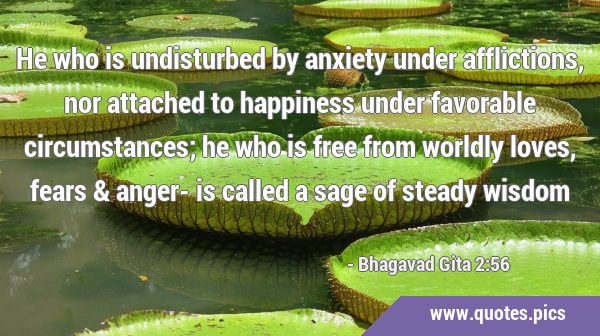 He who is undisturbed by anxiety under afflictions, nor attached to happiness under favorable circumstances; he who is free from worldly loves, fears & anger- is called a sage of steady wisdom
He who is undisturbed by anxiety under afflictions, nor attached to happiness under favorable circumstances; he who is free from worldly loves, fears & anger- is called a sage of steady wisdom  As a boat on the waters is carried off course by a gale, so an individual's discrimination is driven from its intended path when the mind succumbs to the wandering senses.
As a boat on the waters is carried off course by a gale, so an individual's discrimination is driven from its intended path when the mind succumbs to the wandering senses.  He who is everywhere nonattached, neither joyously excited by encountering good nor disturbed by evil, has an established wisdom
He who is everywhere nonattached, neither joyously excited by encountering good nor disturbed by evil, has an established wisdom 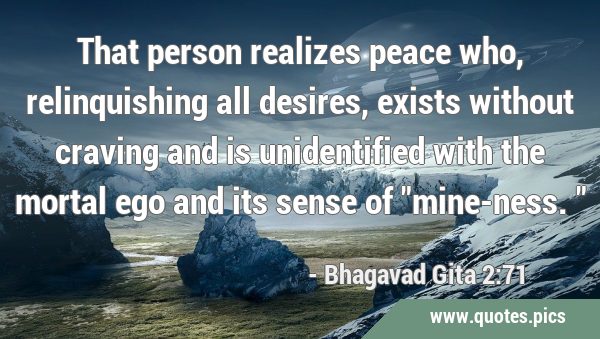 That person realizes peace who, relinquishing all desires, exists without craving and is unidentified with the mortal ego and its sense of "mine-ness."
That person realizes peace who, relinquishing all desires, exists without craving and is unidentified with the mortal ego and its sense of "mine-ness."  The best type of yogi is he who feels for others, whether in grief or pleasure, even as he feels for himself.
The best type of yogi is he who feels for others, whether in grief or pleasure, even as he feels for himself.  He who withdraws his senses from the objects of perception, just as a tortoise withdraws its limbs into its shell, is established in steady wisdom
He who withdraws his senses from the objects of perception, just as a tortoise withdraws its limbs into its shell, is established in steady wisdom  As the ignorant perform actions with attachment and hope of reward, so the wise should act with dispassionate nonattachment, to serve gladly as a guide for the multitudes.
As the ignorant perform actions with attachment and hope of reward, so the wise should act with dispassionate nonattachment, to serve gladly as a guide for the multitudes.  He who is not affected by pain and pleasure, he who is calm and evenminded during pain and pleasure, he alone is eligible for immortality
He who is not affected by pain and pleasure, he who is calm and evenminded during pain and pleasure, he alone is eligible for immortality 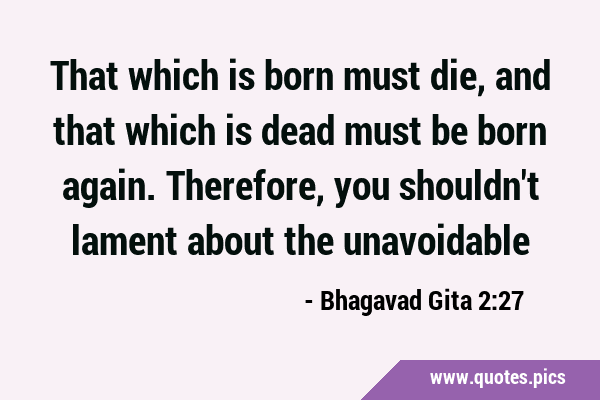 That which is born must die, and that which is dead must be born again. Therefore, you shouldn't lament about the unavoidable
That which is born must die, and that which is dead must be born again. Therefore, you shouldn't lament about the unavoidable 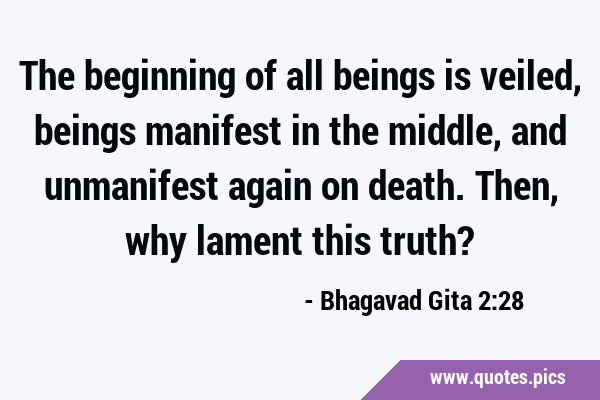 The beginning of all beings is veiled, beings manifest in the middle, and unmanifest again on death. Then, why lament this truth?
The beginning of all beings is veiled, beings manifest in the middle, and unmanifest again on death. Then, why lament this truth?  He is a wise man whose pursuits are all without selfish plan or longings for results, and whose activities are purified by the fire of wisdom.
He is a wise man whose pursuits are all without selfish plan or longings for results, and whose activities are purified by the fire of wisdom. 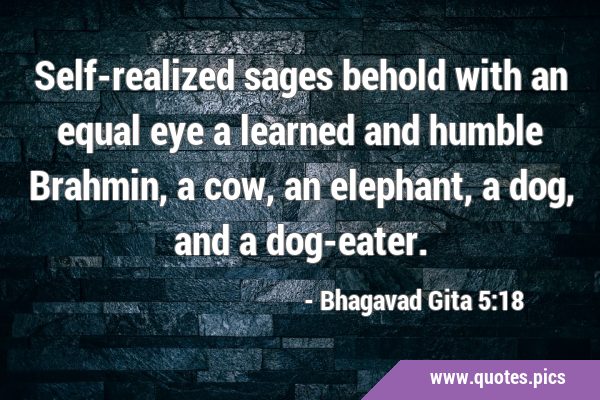 Self-realized sages behold with an equal eye a learned and humble Brahmin, a cow, an elephant, a dog, and a dog-eater.
Self-realized sages behold with an equal eye a learned and humble Brahmin, a cow, an elephant, a dog, and a dog-eater.  You have control over the activity you perform, never the resultant fruit of your actions. Do not consider yourself the creator of the fruits of your activities, nor be attached to inaction
You have control over the activity you perform, never the resultant fruit of your actions. Do not consider yourself the creator of the fruits of your activities, nor be attached to inaction  Even if you are the chief sinner among all sinners, yet by the sole raft of wisdom you shall safely cross the sea of sin
Even if you are the chief sinner among all sinners, yet by the sole raft of wisdom you shall safely cross the sea of sin  As enkindled flame converts firewood into ashes, so does the fire of wisdom consume to ashes all karma.
As enkindled flame converts firewood into ashes, so does the fire of wisdom consume to ashes all karma.  Verily, nothing else in this world is as sanctifying as wisdom. In due course of time, the devotee who is successful in yoga will spontaneously realize this within his Self.
Verily, nothing else in this world is as sanctifying as wisdom. In due course of time, the devotee who is successful in yoga will spontaneously realize this within his Self.  To the knower of Brahman (spirit), all the Vedas (scriptures) are of no utility than is a reservoir when there is a flood from all directions
To the knower of Brahman (spirit), all the Vedas (scriptures) are of no utility than is a reservoir when there is a flood from all directions  The senses naturally experience attachment and aversion to the sense objects but do not be controlled by them, for they are one's enemies
The senses naturally experience attachment and aversion to the sense objects but do not be controlled by them, for they are one's enemies  The man of self-control, roaming among material objects with subjugated senses, and devoid of attraction and repulsion, attains an unshakable inner calmness
The man of self-control, roaming among material objects with subjugated senses, and devoid of attraction and repulsion, attains an unshakable inner calmness
 He is full with contentment who absorbs all desires within, as the brimful ocean remains unmoved by waters entering into it
He is full with contentment who absorbs all desires within, as the brimful ocean remains unmoved by waters entering into it
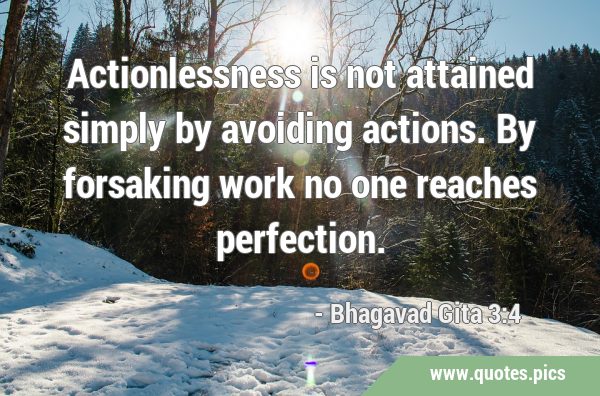 Actionlessness is not attained simply by avoiding actions. By forsaking work no one reaches perfection.
Actionlessness is not attained simply by avoiding actions. By forsaking work no one reaches perfection.
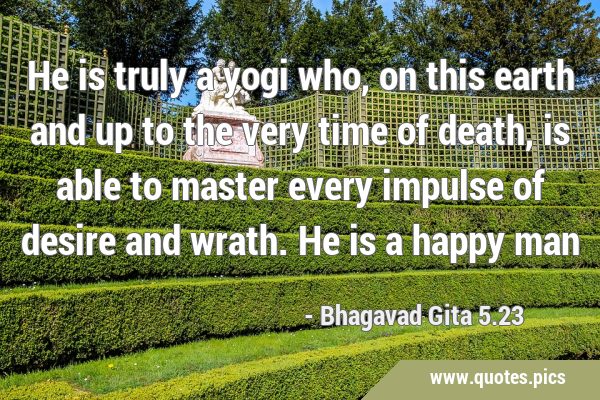 He is truly a yogi who, on this earth and up to the very time of death, is able to master every impulse of desire and wrath. He is a happy man
He is truly a yogi who, on this earth and up to the very time of death, is able to master every impulse of desire and wrath. He is a happy man
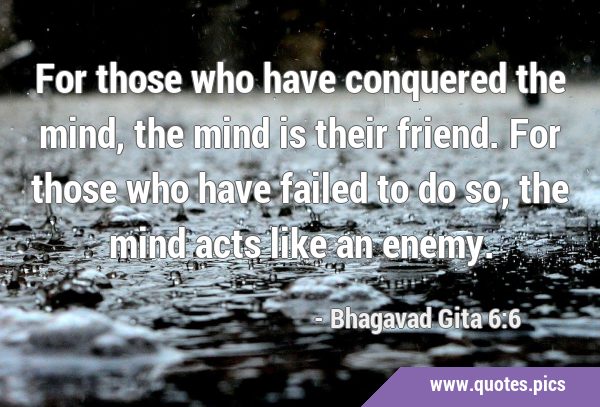 For those who have conquered the mind, the mind is their friend. For those who have failed to do so, the mind acts like an enemy.
For those who have conquered the mind, the mind is their friend. For those who have failed to do so, the mind acts like an enemy.
 He is a supreme yogi who regards with equal-mindedness all men -patrons, friends, enemies, strangers, mediators, hateful beings, relatives, the virtuous and the ungodly
He is a supreme yogi who regards with equal-mindedness all men -patrons, friends, enemies, strangers, mediators, hateful beings, relatives, the virtuous and the ungodly
 Just as a lamp in a windless place does not flicker, so the disciplined mind of a yogi remains steady in meditation
Just as a lamp in a windless place does not flicker, so the disciplined mind of a yogi remains steady in meditation
 The ideas of heat & cold, pleasure & pain, are produced by the contact of the senses with their objects. Such ideas are limited by a beginning & an end, they are transitory, bear them with patience
The ideas of heat & cold, pleasure & pain, are produced by the contact of the senses with their objects. Such ideas are limited by a beginning & an end, they are transitory, bear them with patience
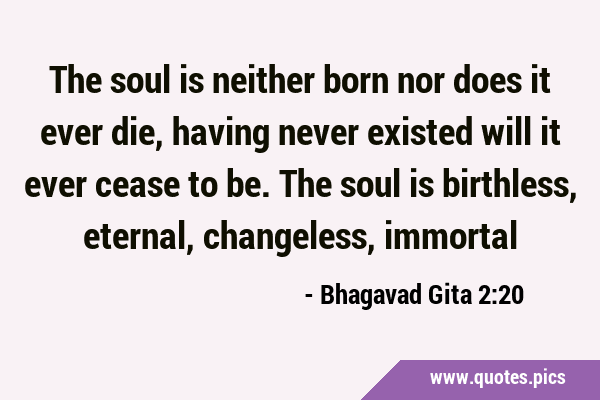 The soul is neither born nor does it ever die, having never existed will it ever cease to be. The soul is birthless, eternal, changeless, immortal
The soul is neither born nor does it ever die, having never existed will it ever cease to be. The soul is birthless, eternal, changeless, immortal
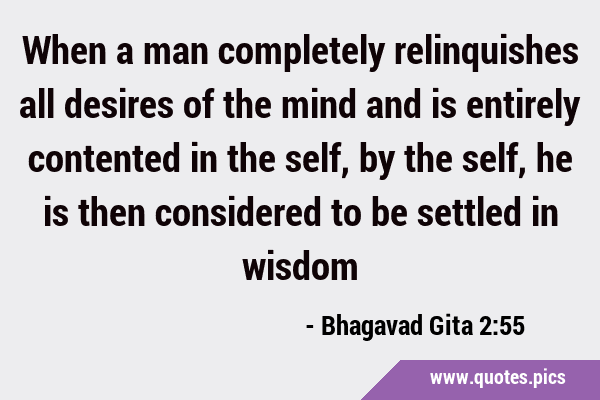 When a man completely relinquishes all desires of the mind and is entirely contented in the self, by the self, he is then considered to be settled in wisdom
When a man completely relinquishes all desires of the mind and is entirely contented in the self, by the self, he is then considered to be settled in wisdom
 Brooding on sense objects causes attachment to them. Attachment creates craving; craving leads to anger
Brooding on sense objects causes attachment to them. Attachment creates craving; craving leads to anger
 There is no one who can remain without action even for a moment. Indeed, all beings are compelled to act by their qualities(Gunas) born of material nature(Prakriti)
There is no one who can remain without action even for a moment. Indeed, all beings are compelled to act by their qualities(Gunas) born of material nature(Prakriti)
 Giving up attachment, perform actions as a matter of duty, for by working without being attached to the fruits, one attains the supreme bliss
Giving up attachment, perform actions as a matter of duty, for by working without being attached to the fruits, one attains the supreme bliss
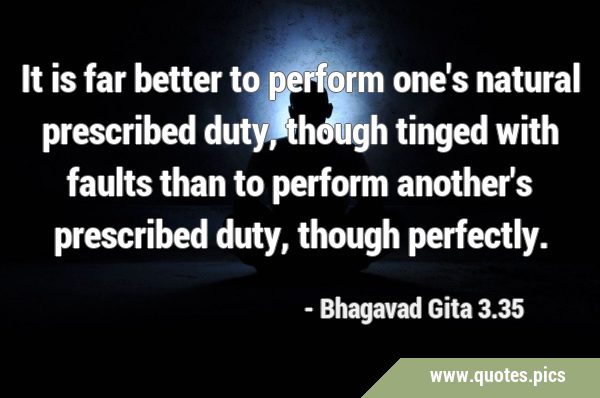 It is far better to perform one's natural prescribed duty, though tinged with faults than to perform another's prescribed duty, though perfectly.
It is far better to perform one's natural prescribed duty, though tinged with faults than to perform another's prescribed duty, though perfectly.
 Just as a fire is covered by smoke, a mirror is masked by dust, and an embryo is concealed by the womb; similarly, one's knowledge gets covered by desire
Just as a fire is covered by smoke, a mirror is masked by dust, and an embryo is concealed by the womb; similarly, one's knowledge gets covered by desire
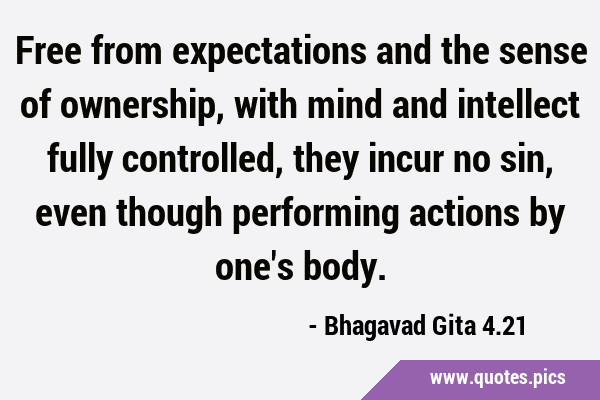 Free from expectations and the sense of ownership, with mind and intellect fully controlled, they incur no sin, even though performing actions by one's body.
Free from expectations and the sense of ownership, with mind and intellect fully controlled, they incur no sin, even though performing actions by one's body.
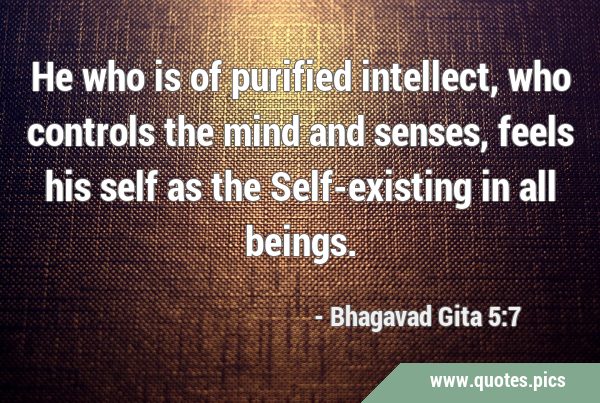 He who is of purified intellect, who controls the mind and senses, feels his self as the Self-existing in all beings.
He who is of purified intellect, who controls the mind and senses, feels his self as the Self-existing in all beings.
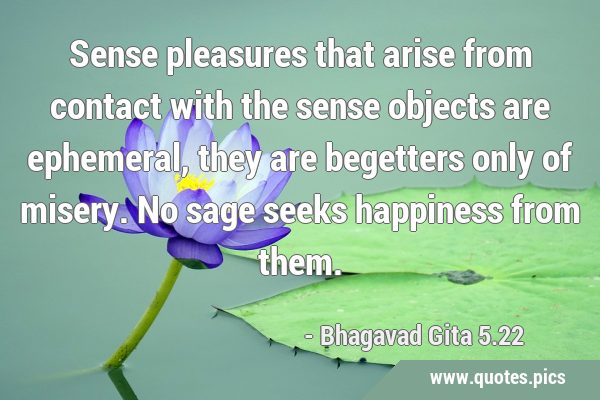 Sense pleasures that arise from contact with the sense objects are ephemeral, they are begetters only of misery. No sage seeks happiness from them.
Sense pleasures that arise from contact with the sense objects are ephemeral, they are begetters only of misery. No sage seeks happiness from them.
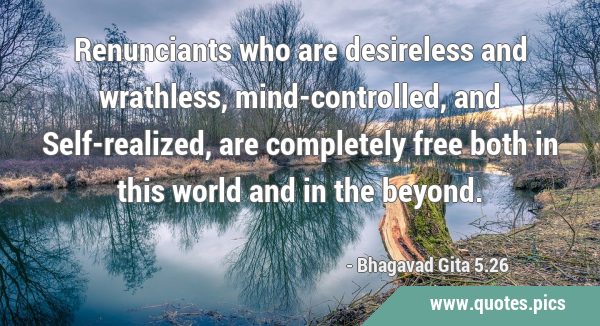 Renunciants who are desireless and wrathless, mind-controlled, and Self-realized, are completely free both in this world and in the beyond.
Renunciants who are desireless and wrathless, mind-controlled, and Self-realized, are completely free both in this world and in the beyond.
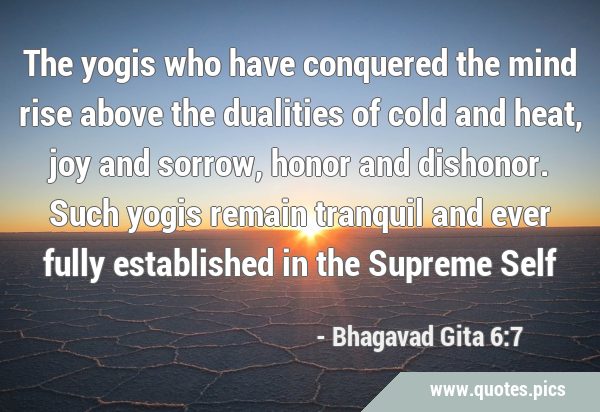 The yogis who have conquered the mind rise above the dualities of cold and heat, joy and sorrow, honor and dishonor. Such yogis remain tranquil and ever fully established in the Supreme Self
The yogis who have conquered the mind rise above the dualities of cold and heat, joy and sorrow, honor and dishonor. Such yogis remain tranquil and ever fully established in the Supreme Self
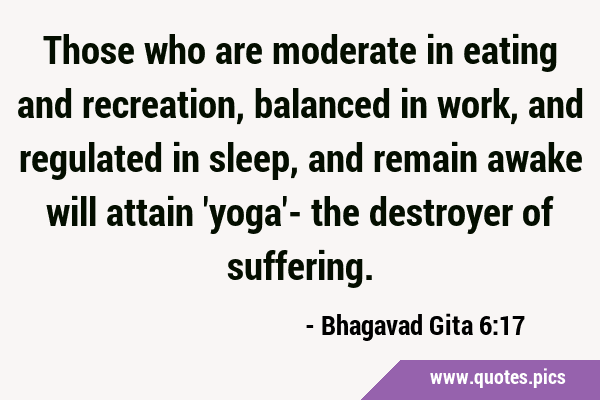 Those who are moderate in eating and recreation, balanced in work, and regulated in sleep, and remain awake will attain 'yoga'- the destroyer of suffering.
Those who are moderate in eating and recreation, balanced in work, and regulated in sleep, and remain awake will attain 'yoga'- the destroyer of suffering.
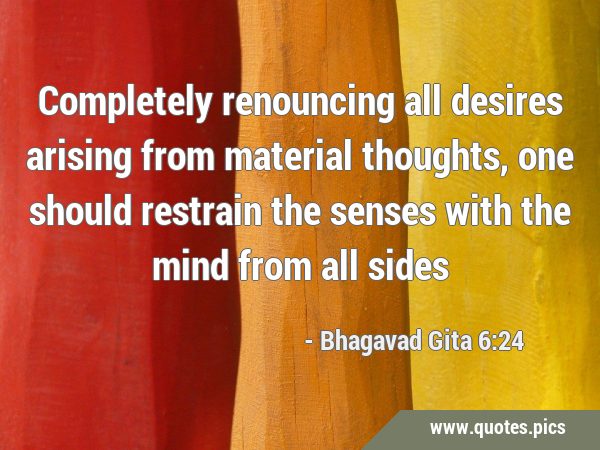 Completely renouncing all desires arising from material thoughts, one should restrain the senses with the mind from all sides
Completely renouncing all desires arising from material thoughts, one should restrain the senses with the mind from all sides
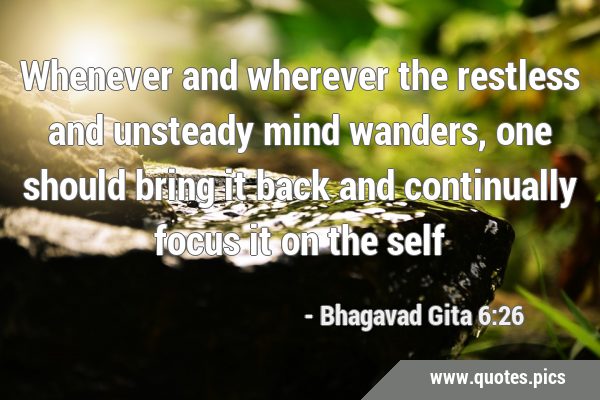 Whenever and wherever the restless and unsteady mind wanders, one should bring it back and continually focus it on the self
Whenever and wherever the restless and unsteady mind wanders, one should bring it back and continually focus it on the self
 That yogi stays forever in Me, who, anchored in divine unity whatever his mode of existence, realizes Me as pervading all beings.
That yogi stays forever in Me, who, anchored in divine unity whatever his mode of existence, realizes Me as pervading all beings.
 Undoubtedly the mind is fickle and unruly; but by yoga practice and by dispassion, the mind may nevertheless be controlled.
Undoubtedly the mind is fickle and unruly; but by yoga practice and by dispassion, the mind may nevertheless be controlled.
 A performer of good actions never meets destruction. Whether in this world or in the beyond, he falls not into evil plight
A performer of good actions never meets destruction. Whether in this world or in the beyond, he falls not into evil plight
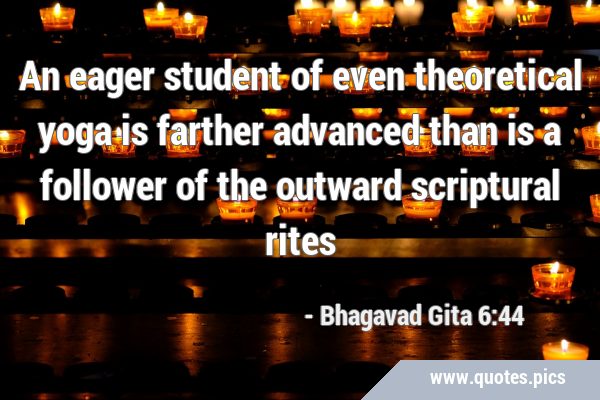 An eager student of even theoretical yoga is farther advanced than is a follower of the outward scriptural rites
An eager student of even theoretical yoga is farther advanced than is a follower of the outward scriptural rites
 Whatever embodiment (a God-incarnate, a saint, or a deity) a devotee strives faithfully to worship, it is I who make his devotion unflinching
Whatever embodiment (a God-incarnate, a saint, or a deity) a devotee strives faithfully to worship, it is I who make his devotion unflinching
 Those who neither rejoice in pleasures nor despair in sorrows, neither lament for any loss nor hanker for any gain, who renounce both good & evil deeds, such persons are dear to me
Those who neither rejoice in pleasures nor despair in sorrows, neither lament for any loss nor hanker for any gain, who renounce both good & evil deeds, such persons are dear to me
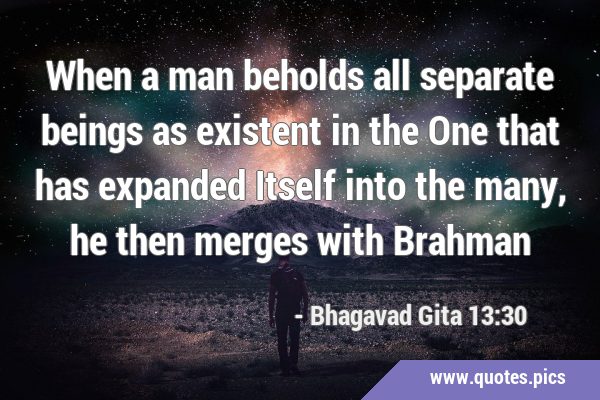 When a man beholds all separate beings as existent in the One that has expanded Itself into the many, he then merges with Brahman
When a man beholds all separate beings as existent in the One that has expanded Itself into the many, he then merges with Brahman
 I am seated in the hearts of all living beings, and from Me come memory, knowledge, as well as forgetfulness.
I am seated in the hearts of all living beings, and from Me come memory, knowledge, as well as forgetfulness.
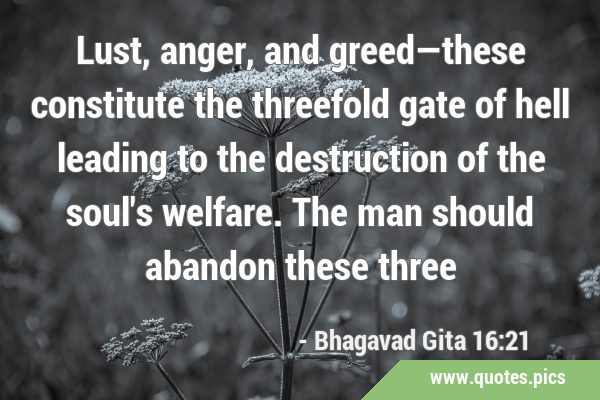 Lust, anger, and greed—these constitute the threefold gate of hell leading to the destruction of the soul's welfare. The man should abandon these three
Lust, anger, and greed—these constitute the threefold gate of hell leading to the destruction of the soul's welfare. The man should abandon these three
 It is truly impossible for an embodied being to abandon actions completely, but he who relinquishes the fruit of action is called a renunciant.
It is truly impossible for an embodied being to abandon actions completely, but he who relinquishes the fruit of action is called a renunciant.
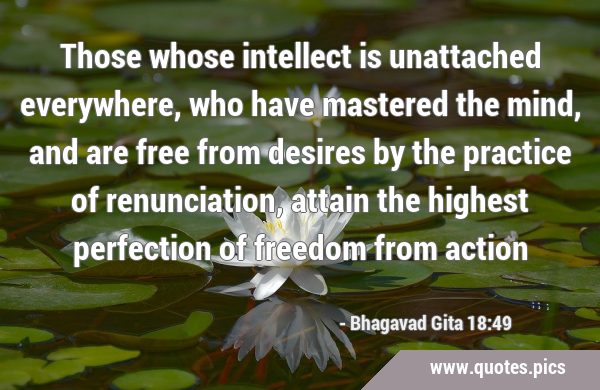 Those whose intellect is unattached everywhere, who have mastered the mind, and are free from desires by the practice of renunciation, attain the highest perfection of freedom from action
Those whose intellect is unattached everywhere, who have mastered the mind, and are free from desires by the practice of renunciation, attain the highest perfection of freedom from action
 Just as a person forsakes worn-out clothes and wears new clothes, the soul leaves the worn-out body at the time of death and enters a new body
Just as a person forsakes worn-out clothes and wears new clothes, the soul leaves the worn-out body at the time of death and enters a new body
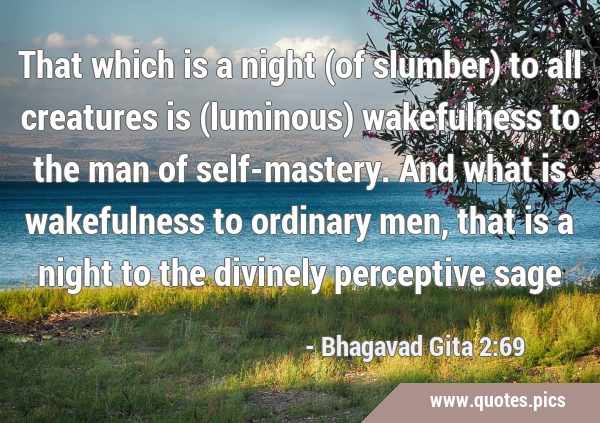 That which is a night (of slumber) to all creatures is (luminous) wakefulness to the man of self-mastery. And what is wakefulness to ordinary men, that is a night to the divinely perceptive sage
That which is a night (of slumber) to all creatures is (luminous) wakefulness to the man of self-mastery. And what is wakefulness to ordinary men, that is a night to the divinely perceptive sage
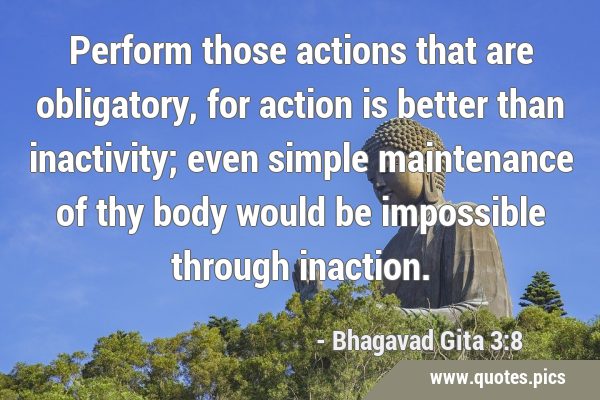 Perform those actions that are obligatory, for action is better than inactivity; even simple maintenance of thy body would be impossible through inaction.
Perform those actions that are obligatory, for action is better than inactivity; even simple maintenance of thy body would be impossible through inaction.
 Work must be done as a sacrifice to the Supreme Lord; otherwise, work causes bondage in this material world.
Work must be done as a sacrifice to the Supreme Lord; otherwise, work causes bondage in this material world.
 Whatever a great person does, common people imitate. His actions set a standard for the people of the world.
Whatever a great person does, common people imitate. His actions set a standard for the people of the world.
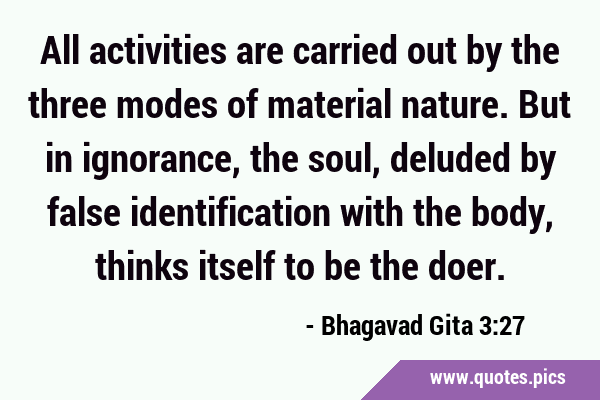 All activities are carried out by the three modes of material nature. But in ignorance, the soul, deluded by false identification with the body, thinks itself to be the doer.
All activities are carried out by the three modes of material nature. But in ignorance, the soul, deluded by false identification with the body, thinks itself to be the doer.
 Even wise people act according to their natures, for all living beings are propelled by their natural tendencies. What will one gain by repression?
Even wise people act according to their natures, for all living beings are propelled by their natural tendencies. What will one gain by repression?
 It is preferable to die in the discharge of one's duty than to follow the path of another, which is fraught with danger.
It is preferable to die in the discharge of one's duty than to follow the path of another, which is fraught with danger.
 In whatever way people surrender unto me, I reciprocate with them accordingly. Everyone follows my path, knowingly or unknowingly
In whatever way people surrender unto me, I reciprocate with them accordingly. Everyone follows my path, knowingly or unknowingly
 Those who see action in inaction and inaction in action are truly wise amongst humans. Although performing all kinds of actions, they are yogis and masters of all their actions.
Those who see action in inaction and inaction in action are truly wise amongst humans. Although performing all kinds of actions, they are yogis and masters of all their actions.
 Relinquishing attachment to the fruits of work, always contented, independent of material rewards, the wise do not perform any binding action even in the midst of activities
Relinquishing attachment to the fruits of work, always contented, independent of material rewards, the wise do not perform any binding action even in the midst of activities
 Salvation is found by both renunciation and performance of the action. But of these two, the Yoga of action (Karma Yoga) is better than the renunciation of works.
Salvation is found by both renunciation and performance of the action. But of these two, the Yoga of action (Karma Yoga) is better than the renunciation of works.
 Just as a lotus leaf is unsullied by water, the yogi who performs actions, forswearing attachment and surrendering his actions to the Infinite, remains unbound by the sin
Just as a lotus leaf is unsullied by water, the yogi who performs actions, forswearing attachment and surrendering his actions to the Infinite, remains unbound by the sin
 He who perceives Me everywhere and beholds everything in me never loses sight of me, nor do I ever lose sight of him
He who perceives Me everywhere and beholds everything in me never loses sight of me, nor do I ever lose sight of him
 Among thousands of men, perhaps one strives for spiritual attainment; and, among the blessed true seekers that assiduously try to reach Me, perhaps one perceives Me as I am.
Among thousands of men, perhaps one strives for spiritual attainment; and, among the blessed true seekers that assiduously try to reach Me, perhaps one perceives Me as I am.
 There is nothing higher than Me, or beyond Me. All things are strung to Me like a row of gems on a thread.
There is nothing higher than Me, or beyond Me. All things are strung to Me like a row of gems on a thread.
 I am impartial toward all beings. To Me none is hateful, none is dear. But those who give Me their heart's love are in Me, as I am in them
I am impartial toward all beings. To Me none is hateful, none is dear. But those who give Me their heart's love are in Me, as I am in them
 Those devotees are very dear to Me who are free from malice toward all living beings, who are friendly, and compassionate.
Those devotees are very dear to Me who are free from malice toward all living beings, who are friendly, and compassionate.
 He who is tranquil before friend and foe alike, and in encountering adoration and insult, and during the experiences of warmth and chill and of pleasure and suffering... that person is dear to Me
He who is tranquil before friend and foe alike, and in encountering adoration and insult, and during the experiences of warmth and chill and of pleasure and suffering... that person is dear to Me
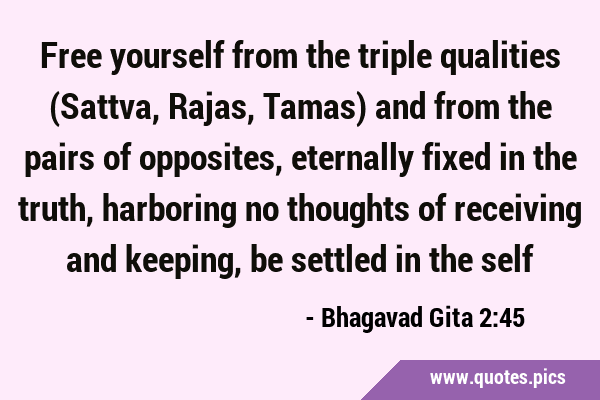 Free yourself from the triple qualities (Sattva, Rajas, Tamas) and from the pairs of opposites, eternally fixed in the truth, harboring no thoughts of receiving and keeping, be settled in the self
Free yourself from the triple qualities (Sattva, Rajas, Tamas) and from the pairs of opposites, eternally fixed in the truth, harboring no thoughts of receiving and keeping, be settled in the self
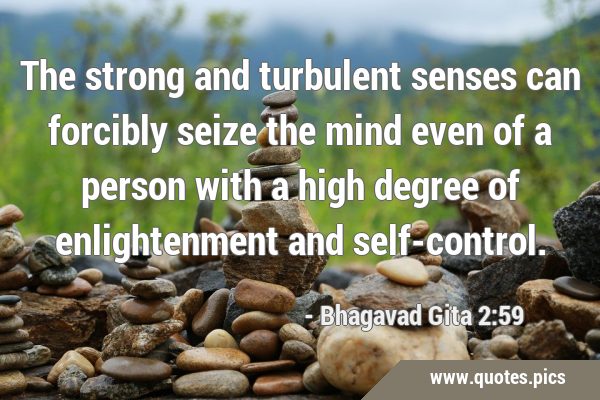 The strong and turbulent senses can forcibly seize the mind even of a person with a high degree of enlightenment and self-control.
The strong and turbulent senses can forcibly seize the mind even of a person with a high degree of enlightenment and self-control.
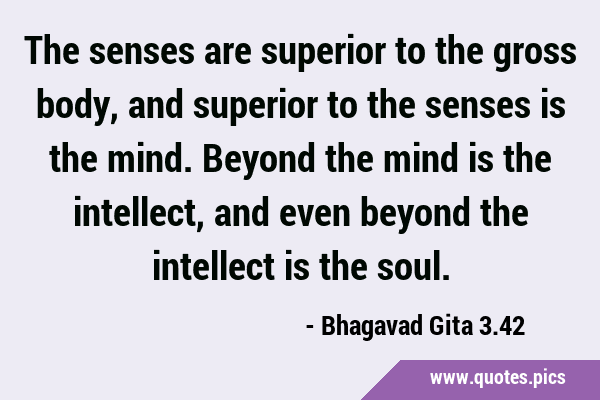 The senses are superior to the gross body, and superior to the senses is the mind. Beyond the mind is the intellect, and even beyond the intellect is the soul.
The senses are superior to the gross body, and superior to the senses is the mind. Beyond the mind is the intellect, and even beyond the intellect is the soul.
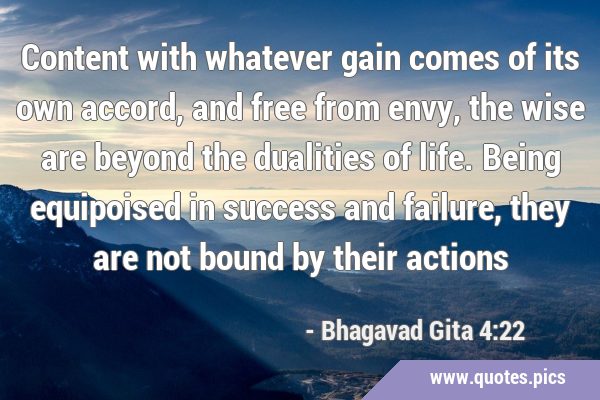 Content with whatever gain comes of its own accord, and free from envy, the wise are beyond the dualities of life. Being equipoised in success and failure, they are not bound by their actions
Content with whatever gain comes of its own accord, and free from envy, the wise are beyond the dualities of life. Being equipoised in success and failure, they are not bound by their actions
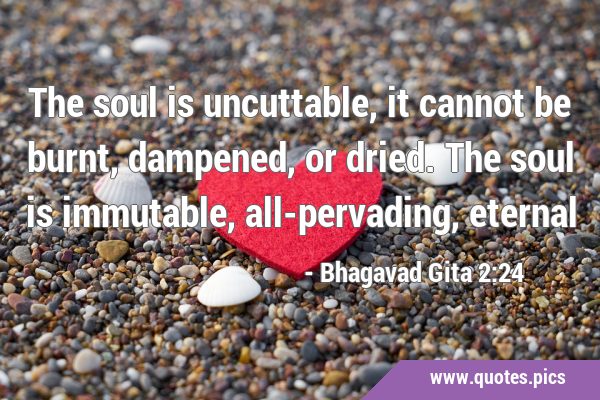 The soul is uncuttable, it cannot be burnt, dampened, or dried. The soul is immutable, all-pervading, eternal
The soul is uncuttable, it cannot be burnt, dampened, or dried. The soul is immutable, all-pervading, eternal

